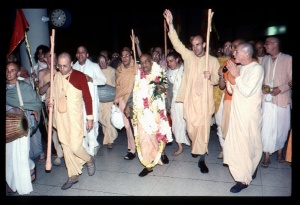CC Adi 7.149 (1975)

A.C. Bhaktivedanta Swami Prabhupada
Below is the 1996 edition text, ready to be substituted with the 1975 one using the compile form.
TEXT 149
- sei haite sannyāsīra phiri gela mana
- ‘kṛṣṇa’ ‘kṛṣṇa’ nāma sadā karaye grahaṇa
SYNONYMS
sei haite—from that time; sannyāsīra—all the Māyāvādī sannyāsīs; phiri—turn; gela—became; mana—mind; kṛṣṇa kṛṣṇa—the holy name of the Supreme Personality of Godhead, Kṛṣṇa; nāma—name; sadā—always; karaye—do; grahaṇa—accept.
TRANSLATION
From that moment when the Māyāvādī sannyāsīs heard the explanation of the Vedānta-sūtra from the Lord, their minds changed, and on the instruction of Caitanya Mahāprabhu, they too chanted “Kṛṣṇa! Kṛṣṇa!” always.
PURPORT
In this connection it may be mentioned that sometimes the sahajiyā class of devotees opine that Prakāśānanda Sarasvatī and Prabodhānanda Sarasvatī are the same man. Prabodhānanda Sarasvatī was a great Vaiṣṇava devotee of Lord Caitanya Mahāprabhu, but Prakāśānanda Sarasvatī, the head of the Māyāvādī sannyāsīs in Benares, was a different person. Prabodhānanda Sarasvatī belonged to the Rāmānuja-sampradāya, whereas Prakāśānanda Sarasvatī belonged to the Śaṅkarācārya-sampradāya. Prabodhānanda Sarasvatī wrote a number of books, among which are the Caitanya-candrāmṛta, Rādhā-rasa-sudhā-nidhi, Saṅgīta-mādhava, Vṛndāvana-śataka and Navadvīpa-śataka. While traveling in southern India, Caitanya Mahāprabhu met Prabodhānanda Sarasvatī, who had two brothers, Veṅkaṭa Bhaṭṭa and Tirumalaya Bhaṭṭa, who were Vaiṣṇavas of the Rāmānuja-sampradāya. Gopāla Bhaṭṭa Gosvāmī was the nephew of Prabodhānanda Sarasvatī. From historical records it is found that Śrī Caitanya Mahāprabhu traveled in South India in the year 1433 Śakābda (A.D. 1511) during the Cāturmāsya period, and it was at that time that He met Prabodhānanda, who belonged to the Rāmānuja-sampradāya. How then could the same person meet Him as a member of the Śaṅkara-sampradāya in 1435 Śakābda, two years later? It is to be concluded that the guess of the sahajiyā-sampradāya that Prabodhānanda Sarasvatī and Prakāśānanda Sarasvatī were the same man is a mistaken idea.